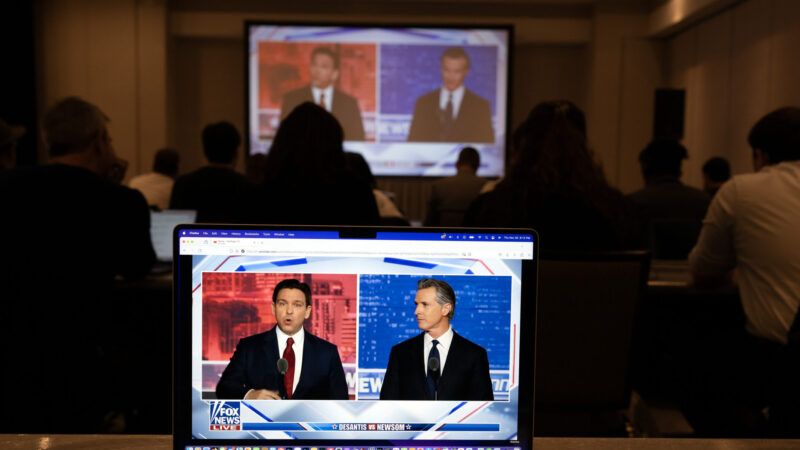The DeSantis-Newsom Debate Was Really a Debate About COVID
Too bad that was only a small part of the 90-minute affair.

Moments into Thursday night's one-on-one debate between Florida Gov. Ron DeSantis and California Gov. Gavin Newsom, the Democrat issued a pointed barb at his Republican counterpart.
"Neither of us," Newsom predicted, "will be the nominee in our party in 2024." (Unlike DeSantis, Newsom is not even running for president—at least not officially.)
After the slapfight that followed, Americans can only hope that's true.
Though it was sold as a showdown between the chief executives of what may be America's most iconic "red" and "blue" states—and perhaps a preview of a presidential campaign next year or in 2028—the debate quickly devolved into a nearly unwatchable mess. The two men kept talking over one another while the moderator, Fox News host Sean Hannity, struggled to keep the conversation focused.
Newsom had little interest in engaging with the premise of the debate: which state had a better style of governance. It's hard to blame him for that. California is losing population, it has a higher unemployment rate than Florida, and its residents suffer under significantly higher taxes. The first 20 minutes of the debate consisted of Hannity teeing up those facts one after the next, letting DeSantis swing away, and then asking Newsom to explain why California seems to suck. That was never going to produce a productive discussion, and it didn't.
Instead, Newsom played the role of loyal Joe Biden surrogate—he started his very first answer of the night with "I'm here to tell the truth about the Biden/Harris record." And since he had little interest in defending his own track record, it quickly became obvious that Newsom was on the debate stage to rope-a-dope DeSantis into losing his cool and looking unserious.
He largely succeeded. "Ron, relax," he chuckled at one point near the end of the 90-minute affair, after hooking the Flordia governor into another loud and meaningless shoutfest.
If there was one area of the debate where a true clash of visions seemed inevitable, it was the COVID-19 pandemic—and, indeed, that topic produced the most telling exchange of the night.
Newsom jumped at the chance to point out that DeSantis locked down many public and private spaces at the start of the pandemic. This is true, but it's far from the whole story, and that should have given DeSantis an opportunity to argue as much—and to point out that Florida's emphasis on personal responsibility is a big part of the reason why the state lured so many people during and after the pandemic.
Instead, DeSantis spiraled off into an answer about excess mortality rates, and Hannity interjected to point out that both Florida and California had lower death rates than the national average. Those statistics are important, of course, but they're not going to convince anyone of much at this point. Anyway, research suggests it made little difference to mortality rates in the long run whether a state had aggressive or permissive COVID policies.
Having already attacked DeSantis for being too aggressive in responding to COVID, Newsom flipped his argument on its head just moments later and claimed that Florida's speedy reopening cost "tens of thousands of lives." It makes little sense to argue that DeSantis did too little but also too much if your goal is to have a productive discussion about governance strategies. Newsom got away with muddying the debate because he has nothing to lose, since he's not running for anything (though, asked directly by Hannity, Newsom refused to say directly that he would rule out a run as Biden's replacement).
Indeed, the very fact that Newsom was trying to argue that DeSantis was "a lockdown governor" says something pretty definitive about which side won that debate, doesn't it? Newsom can't fix his record on COVID, so his only option here was to try to make DeSantis seem equally bad.
DeSantis did eventually find his footing long enough to deliver a retort. "Gavin Newsom did huge damage to people in California. He ruined livelihoods," he said, in perhaps his strongest moment of the night. "We had our kids in school. He had the kids locked out of school because of the teachers union. That is having a generational impact."
Finally, there seemed to be an actual debate happening. One that involved contrasting visions for the relationship between Americans and their state governments. More of that would have been great! But it was time for a commercial break, and when the show resumed it moved on to more obviously partisan issues—guns, abortion, and how they feel about Biden's track record—where the two men's positions aren't as nuanced or illustrative as their responses to COVID.
At least some of the blame for the disappointing event must rest with Hannity, who simply tried to cover too much ground in a limited amount of time. Why were two governors being asked about China policy, or Israel's war in the Gaza Strip? Not everything needs to be a presidential debate, and this certainly shouldn't have been treated like one—particularly since one of the men isn't running for national office. A tighter focus on state policies, and COVID policy especially, would have allowed more clarity to emerge.
Newsom had little to lose on Thursday, and he acted like it. DeSantis needed to use Thursday's debate to prove that he's a stronger candidate in a one-on-one setting than he's appeared in the GOP's larger forums. After struggling to deal with Newsom's mudslinging, DeSantis should probably be glad that Donald Trump keeps skipping the primary debates.
If these two men meet on another debate stage with higher stakes at some future date, perhaps we'll see a better clash of ideas and visions. Of course, that would also mean that one of them is likely to become president—and Thursday's event shouldn't make anyone eager for that.


Show Comments (66)